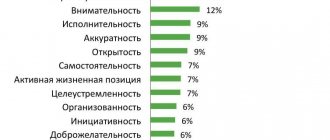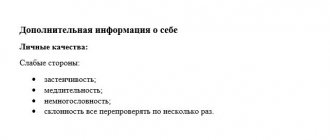When compiling a resume, applicants usually describe “Work Experience” in great detail, and the “Personal Qualities” section often remains blank; many treat this item formally, underestimating its significance. But for the employer, this information is no less important than the professional skills, achievements and functional responsibilities of the applicant at the previous place of work. By indicating your positive personal qualities in your resume, you will have a much greater chance of attracting attention to your candidacy.
Rules for selecting positive qualities for a resume
- In questionnaire forms and templates for initial self-presentation, there may be columns of related meaning: “Positive Traits”, “Personal Characteristics” and “Business Qualities”. Even if there is no such distinction in your resume, you need to be prepared for the fact that during the interview the recruiter will ask you to present such points separately. The first of these groups implies both positive and negative aspects of character. If the interviewer does not isolate these polar meanings, it is wiser to highlight only the positive when telling the story. During an interview, the following question may be asked: “Which of these features do you consider to be your business qualities?” Therefore, it makes sense to sort the selected qualities in advance into character traits and signs of a business personality.
- Any positive qualities must be tied to the position or profession indicated in the vacancy. An exception may be cases when the applicant is not targeting a specific position or job in the selected company.
- The problem of stereotypes in the column about personal merits does not have a clear solution. As already mentioned, some employers organize searches for employees using keywords. If it is vital for a company to staff any department with stress-resistant employees, then with a classic approach to hiring, the recruiter will look for just such a definition in the resume. However, an experienced HR manager of a large company or an employee of a recruitment agency encounters dozens of “stress-resistant” and “punctual” people a day. For such a specialist, standard formulations can mean passivity, incompetence and unmotivation of the candidate. To get out of this difficulty, you can use two techniques:
- conduct preliminary research on the company to which the resume is sent and fill out the field in accordance with the expectations of a particular employer;
- combine template words and phrases with individually modified constructions (examples are provided below);
- It would be appropriate for applicants for management positions to reduce the number of stereotypical expressions in the text.
- It is necessary to remember a dose of humor. A resume is a business document, and for most areas of activity, an exclusively formal presentation style is suitable.
- It is better to limit the number of selected characteristics to 3–7 points.
- When listing the positive aspects, you should start from an objective picture, indicate the traits that are actually inherent in the candidate, and be prepared for the fact that during the interview the HR manager will ask you to confirm any point with examples from life.
What to include in the “key skills” section when filling out your resume
Positive characteristics of men and women
The manifestations of positive moral qualities in males and females are sometimes very different.
For example, when it comes to sociability, women are seen as more likely to chatter, be more open, and trust strangers. Men, on the contrary, communicate only with people they know well, and in essence and to the point. It is more difficult for them to start a conversation, but it is easier to end it at the right moment.
As for discipline, the female sex has been distinguished by this since childhood. Girls, as a rule, can easily follow instructions and do everything as required. But boys differ in this only at a more mature age, when they turn into men.
If we talk about neatness, then women are always neater both in appearance and in their affairs.
When it comes to spending money, girls are usually considered spenders, while young men are considered thrifty. But at the same time, women consider generosity in a man to be one of the best human qualities.
And finally, there are positive character traits that the weaker half is more prone to. These are the following important spiritual qualities of a good person:
- patience;
- tenderness;
- empathy;
- mystery.
But here are the advantages inherent, as a rule, in men:
- masculinity;
- persistence;
- selflessness, altruism;
- stress resistance.
General positive character traits
There are personality traits that are favorably perceived by most people and characterize the applicant as a desirable member of any team. Below is a list of general character strengths that can be used if you do not have information about the qualities required for the job or when writing a non-addressed resume for databases. The list is presented in the form of a table, the left column of which contains popular speech cliches that exist in the recruiting environment. On the right are atypical treatments of these words.
| Adaptability | I am able to quickly adapt to new circumstances |
| Accuracy | Tends to be orderly; I handle things carefully |
| Activity | I prefer an active lifestyle |
| Ambition | I strive for success in everything I do |
| Analytical thinking | I analyze and consider what is happening from different points of view |
| Politeness | I can communicate with people respectfully |
| Attentiveness | I am meticulous in solving problems |
| High efficiency | I am passionate about completing a large number of tasks over a long period of time. |
| Flexibility | I find different ways to solve problems |
| Discipline | I follow the rules and norms of behavior |
| Integrity | I carry out my duties carefully |
| Friendliness | I have a positive attitude towards others; I can find mutual understanding with people |
| Individualism | I prefer to work independently; the habit of taking personal responsibility for one's activities |
| Initiative | I always look for my own solutions and actively participate in processes; I show interest in new developments and projects |
| Performance | I follow instructions diligently and on time |
| Collectivism | I love and know how to work in a team |
| Communication skills | I easily find contact with people, avoid conflicts |
| Creativity | Capable of unconventional thinking and behavior; I prefer a creative approach to problem solving |
| Reliability | Always ready to help in difficult times |
| Perseverance | I demonstrate persistence in achieving goals and achieving results. |
| Resourcefulness | I quickly get out of problematic situations |
| Focus on results | I always prefer to achieve the ultimate goal of my activities |
| Non-conflict | I can find a way out of disagreements |
| Learning ability | Accept new knowledge quickly and effectively |
| Optimism | The habit of finding positive aspects in everything |
| Organizational skills | I can quickly and effectively organize people at work |
| Oratory | I have the gift of persuasion, I express my thoughts competently |
| Responsibility | I am always responsible for my actions |
| Responsiveness | The habit of helping people in difficult situations |
| Pedantry | I perform the assigned functions accurately and accurately |
| Decency | I always feel responsible for my actions; incapable of committing antisocial acts |
| Punctuality | I prefer to strictly follow the rules and keep promises |
| Self-criticism | I treat my own mistakes objectively; prone to independently searching for defects |
| Modesty | Restrained in behavior with other people |
| Scrupulousness | Attentive to detail |
| Stress resistance | I cope calmly with stressful situations |
| Tolerance | I respect other people's opinions |
| Hard work | I enjoy doing the assigned work |
| Honesty | I prefer openness in relationships with managers and others |
| Sensitivity | I can recognize the mood and state of mind of other people |
How to write a cover letter for a job
From this list, it makes sense to highlight business qualities - personality traits that help in fulfilling job duties:
- fast reaction;
- politeness; tolerance;
- cheerfulness;
- diligence; ability to follow instructions and complete tasks quickly;
- communication skills;
- curiosity;
- originality;
- leadership skills;
- organizational skills;
- habit of planning;
- critical way of thinking;
- habit of independent work;
- tendency to take responsibility;
- determination;
- love of change;
- focus on results; determination; assertiveness;
- performance;
- self confidence;
- honesty;
- tactfulness, etc.
What qualities does a loving person have?
Lovers have their own views on the qualities of a person. Here, for example, is a list of the best qualities that they want to see in their lover:
- mercy, in my opinion, there is no love without mercy,
- kindness to your loved one,
- You also need to feel sorry for your loved one, so a little pity won’t hurt,
- respect,
- accept your loved one as he is,
- the ability or at least the desire to understand a person,
- the ability to hide one’s anger, rage, and not lash out at a loved one,
- lack of envy,
- unselfishness,
- sincerity,
- ability to care and look after
- constancy, fidelity,
- lack of pride
- the ability to leave one’s interests for the sake of a loved one, to sacrifice something if necessary.
Not every person can truly love, and first love is not always real, you need to go for it...
Thus, from the very beginning, parents must instill in their children moral values, the qualities of a good person, and be an example for them. Then our society will consist only of decent and kind people.
We examined all the positive qualities of a person in society from different positions. What do you think? Share your opinion with our readers, because you have something to say.
Recommend us on social networks, everyone knows that truth is born only in dispute. We are ready to listen to your opinion, only together we will come to the truth! Until next time.
Personal qualities useful for effective relationships with management
There are at least four different psychological types of leaders (according to K. Leonhard), who differently build a value scale for the character traits of their subordinates and differ in their approach to identifying the “right” employees. Thus, authoritarian bosses prefer to recruit passive, efficient, hardworking employees, while democratic leaders focus primarily on the professionalism and activity of employees. Before monitoring employers and researching the qualities requested in a vacancy, it is worth highlighting the priority goal in your job search. In the case where a person is satisfied with any form of employment without specific wishes for the leadership style, organization of the work process and the collective “atmosphere”, it is wiser to inquire about the personality requirements of candidates. As a rule, such information is presented in the texts of vacancies. If the applicant expects specific conditions for organizing work from the employer, then it is worth truthfully stating the personality characteristics in the characteristics column. In this case, the job search may take a long time, but in the end you will be able to find a comfortable option in which you can use your best sides as successfully as possible. In any case, it is not difficult to select several universal character traits that fit the description of the “ideal” subordinate:
- self-criticism;
- friendliness;
- performance;
- honesty;
- tact;
- politeness;
- tolerance;
- non-conflict;
- hard work;
- stress resistance;
- responsibility;
- loyalty;
- obligation;
- punctuality;
- attentiveness;
- composure;
- flexibility of thinking and behavior.
What are the personality characteristics?
The components of character express the characteristics of states, psychological processes, temperament and behavior of an individual. Its interaction with society and the environment depends on them. Today there are many different classifications of individual traits, as well as typologies of people based on them. Knowledge about them influences awareness, forces you to identify them in yourself, outline a future path and work on yourself.
All positive qualities of a person are accepted and supported in society, unlike negative ones. We must try to eradicate them. However, the division between these groups is conditional and consists of social principles, ethics and morality. After all, personality is a very subtle component. It is impossible to decompose it into “black” and “white”. Apart from this, knowing about the basic properties can help you understand anyone better, be it an employer or a lover.
Professional “selections” of positive personality traits
Regarding the actual character traits, all specialties can be divided into groups in which active communication plays an important role, and activities related to data processing, mechanical and automatic production and other autonomous areas. Therefore, for the first category (teachers, consultants, client managers, administrators, actors, interpreters, service personnel, journalists, and so on), the most important signs of professional suitability will be communication skills. And in the class of “introverted” specialties (financiers, researchers, analysts, workers, programmers, traders, designers), qualities such as accuracy, thoroughness, thoughtfulness, and the like are more valued. There are, however, professions (for example, call center operator, investigator, security specialist and others) that require a combination of these features. Here are approximate lists of properties that will help to advantageously describe your character to applicants for some popular positions:
- Sales manager: initiative, independence, activity, determination, stress resistance, ability to contact people, goodwill, cheerfulness, decency, loyalty, sociability, results-oriented, optimism, tolerance, flexibility, attentiveness, sociability, politeness, organization, learning ability, responsiveness .
- Accountant: scrupulousness, attentiveness, accuracy, pedantry, high efficiency, perseverance, self-control, responsibility, loyalty, honesty, decency, trustworthiness, hard work, determination.
- Lawyer: analytical skills, logical thinking, accuracy, attentiveness, initiative, responsibility, sociability, friendliness, diligence, observation, integrity, commitment, perseverance, honesty, stress resistance, confidence.
- Leader: charisma, leadership, organizational skills, enterprise, resourcefulness, stress resistance, result orientation, creativity, sociability, non-conflict, optimism, responsibility, perseverance, confidence, organization.
What business qualities should you include in your resume?
Assessment of employee professional qualities
To avoid wasting time and money testing new employees, companies sometimes evaluate them before hiring. There are even special personnel assessment centers created for this purpose. A list of assessment methods for those who prefer to do it themselves:
- Letters of recommendation.
- Tests. These include routine aptitude and aptitude tests, as well as personality and biographical tests.
- Interview.
- An exam on the knowledge and skills of an employee.
- Role play or cases.
Role-playing will help you find out in practice whether the applicant is suitable for you. Simulate an everyday situation for his position and see how he copes. For example, evaluate his customer interaction skills. Let the buyer be your competent employee or yourself, and the applicant will show what he is capable of. You can set a goal for him to achieve during the game, or simply observe his working style. This method will tell you much more about the applicant than the “Personal Qualities” column on a resume.
When deciding on evaluation criteria, you can base your assessment on business qualities: punctuality, potential quantity and quality of work performed, experience and education, skills, etc. For greater efficiency, focus on the qualities required for the position for which the candidate being assessed is applying. To be confident in an employee, consider his personal qualities. You can conduct an assessment yourself in the form of a ranking of candidates, placing + and – according to certain criteria, distributing them by level or awarding points. Avoid assessment pitfalls such as bias or stereotyping, or placing too much weight on one criterion.
Innovations in personality assessment techniques
The applicant must be prepared for the fact that when meeting with a personnel manager, he will have to prove his stated merits, pass a hidden psychological test, or become familiar with non-standard interview methods. The most harmless request is to provide examples from life that illustrate a specific positive quality. Another method of testing applicants is also gaining momentum. Instead of stereotypical questions regarding individual sections of the application form, the HR manager, immediately after the greeting, invites the candidate to tell about himself.
An experienced specialist can choose successful key stages from a professional biography for narration. At this moment, the applicant is assessed by the psychologist in summary - the type of thinking, the general maturity of the individual, focus on the process or result, the tendency to accept personal responsibility or place blame on others, the degree of activity, exposure to other people’s opinions, conflict, the ability to see problems and solve them are revealed. In this case, the interviewer’s conclusions may contradict the statements of the resume, which in itself does not have negative consequences if the candidate’s professional merits are at their best.
However, for some positions (related to financial responsibility, people management, and so on), the refusal of the personnel service, justified by a discrepancy in personal qualities, can be decisive. The third method, which is gradually spreading in the HR environment, is called the method of stress, game or role-playing interviews. The candidate may be placed in conditions that are designed to destroy his strategy and reveal his true personality traits. For example, some companies practice aggressive, impolite behavior of an HR employee, rude verbal statements towards an applicant, a manager being late for an interview, and the like.
Among the functionality of activists of new technologies is spilling coffee on the applicant, simulating fainting, an invitation to play chess with the head of the company, a request to help clean up the office, etc. The main thing that a job seeker needs to remember in such a situation is his own goal: to get a job and obtain the necessary information about the employer. If the candidate’s behavior during the interview does not correspond with the qualities stated in the resume, such a discrepancy will become a reason for the employer to at least doubt the honesty and self-esteem of the applicant.
First job
If your career is just beginning and your resume is being compiled for the first time, then the section on personal qualities can be filled out as follows:
- Desire to work fruitfully in a team.
- Creative approach to business and creativity.
- Activity.
- Good memory.
- Easy to learn.
- Desire to improve and learn.
For a specific vacancy, you need to determine your priority options for personal qualities - depending on the proposed position and profession.
Little tricks
To prevent an employer from immediately trashing your resume after reading about your shortcomings, don't be too open. Neutral qualities that cannot in any way affect future work are quite suitable. The following personal qualities (disadvantages) are suitable for almost any vacancy:
- Fear of airplanes.
- Ophidiophobia (fear of snakes).
- Vespertiliophobia (fear of bats).
- Arachnophobia (fear of spiders).
- Love for sweets.
- Lack of experience.
- Love for shopping.
- Excess weight.
Negative qualities
All people have flaws, and if you openly show your weaknesses to an employer, he will understand that you adequately assess your character.
Some negative qualities may be ideal for one type of work and categorically interfere with another activity.
The ability to recognize your own negative character traits is always valued by an employer.
Honestly select a few characteristics from the list below:
- trust only confirmed facts;
- trusting people, naivety;
- excessive demands on oneself and others;
- isolation, desire for solitude;
- slowness;
- inability to perform monotonous work;
- non-standard approach to problem solving, creativity;
- lack of skills and experience in certain activities;
- pedantry, scrupulousness;
- increased sense of responsibility;
- straightforwardness;
- self-confidence;
- modesty;
- excessive activity.
Society's attitude
According to generally accepted opinion, good qualities of a person always lead to personal development. Unacceptable actions, on the contrary, drive you into a dead end. Adequate and dignified behavior is highly valued. Important indicators are fair, ambitious, trusting and kind relationships. Condemned - betrayal, pettiness, envy and indifference.
The manifestation of dark and light sides is always assessed together. There are no ideals. With a good upbringing and compliance with all the parameters of a benefactor, it is possible that the presence of bad habits related to negative properties. Each individual has the right to independently choose an appropriate model of behavior throughout his life.
# How to describe yourself on a resume
Through a description of personal qualities, you must convey to the employer about your work style, interaction with colleagues and superiors - it is important to choose the most suitable ones for the vacancy. Sometimes the requirements specify strict limits - so you should know how to give yourself a short description.
A correct description gives the employer an understanding of what you do, what responsibilities you perform, what results you get from your activities.
Research more information about the company and select 10-15 features that best match the company's values and the tasks you will perform.
Example:
- You are good at selling a variety of products and services.
- You consult, calculate and place orders.
- The result is satisfied customers and increased sales.
Result:
- Positive / Persistent / Energetic.
- Competent / Consistent / Considerate.
- Effective / Valuable / Confident.
# In a word
For example, your position involves a combination of different duties and a high level of responsibility. Therefore, it would be appropriate to reveal yourself as a stress-resistant or multitasking person.
Or you have identified several main qualities for yourself; if you describe a one-word characteristic, you can put several concepts in one sentence:
Example: stress-resistant – I work effectively in multitasking conditions.
# In five words
In such a situation, you already have more opportunities to talk about yourself, but your hand reaches out to write the standard ones: determination, initiative, sociability, stress resistance... Do you really think that someone will take your words seriously?
Stand out! Choose a replacement for templates, because the employer will only have words, and your value and advantages over competitors should be visible through what is written.
Expert opinion
Ekaterina Troitskaya
HR manager
You must be able to explain the character traits mentioned in the questionnaire, because in 99% of cases you will be asked to comment on them during the interview.
Universal designs
Each applicant can choose the most suitable option for him when writing a resume. In this document you can outline your positive features as follows:
- activity, tolerance, accuracy, sociability, initiative;
- scrupulousness, accuracy, honesty, ability to pay attention to details, hard work;
- politeness, punctuality, resourcefulness, conscientiousness, discipline;
- ambition, creativity, communication skills, organizational skills, increased efficiency;
- love of creativity, quick learner, attention to detail, creativity.
Good to know: Your strengths in your resume
Any of the options presented can be written on a resume. But do not forget that there is no single correct design; you must focus on your own characteristics.











